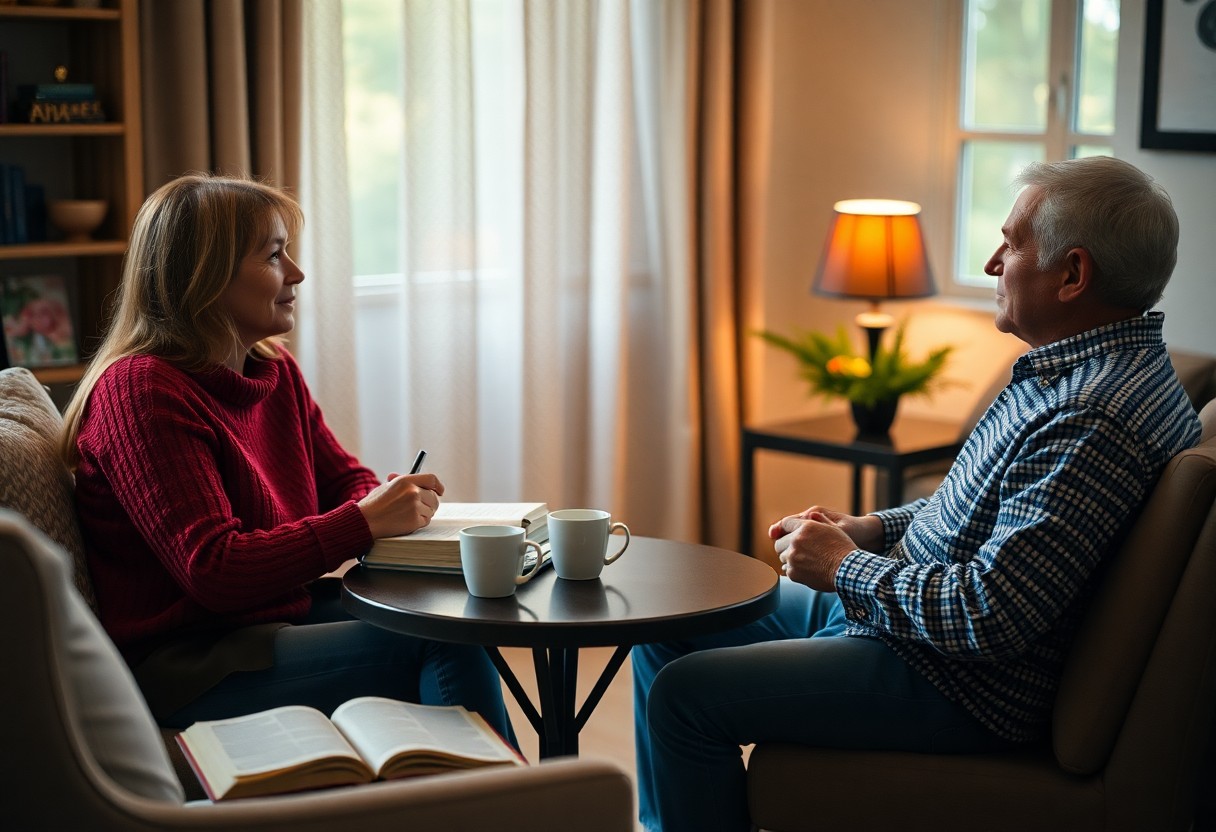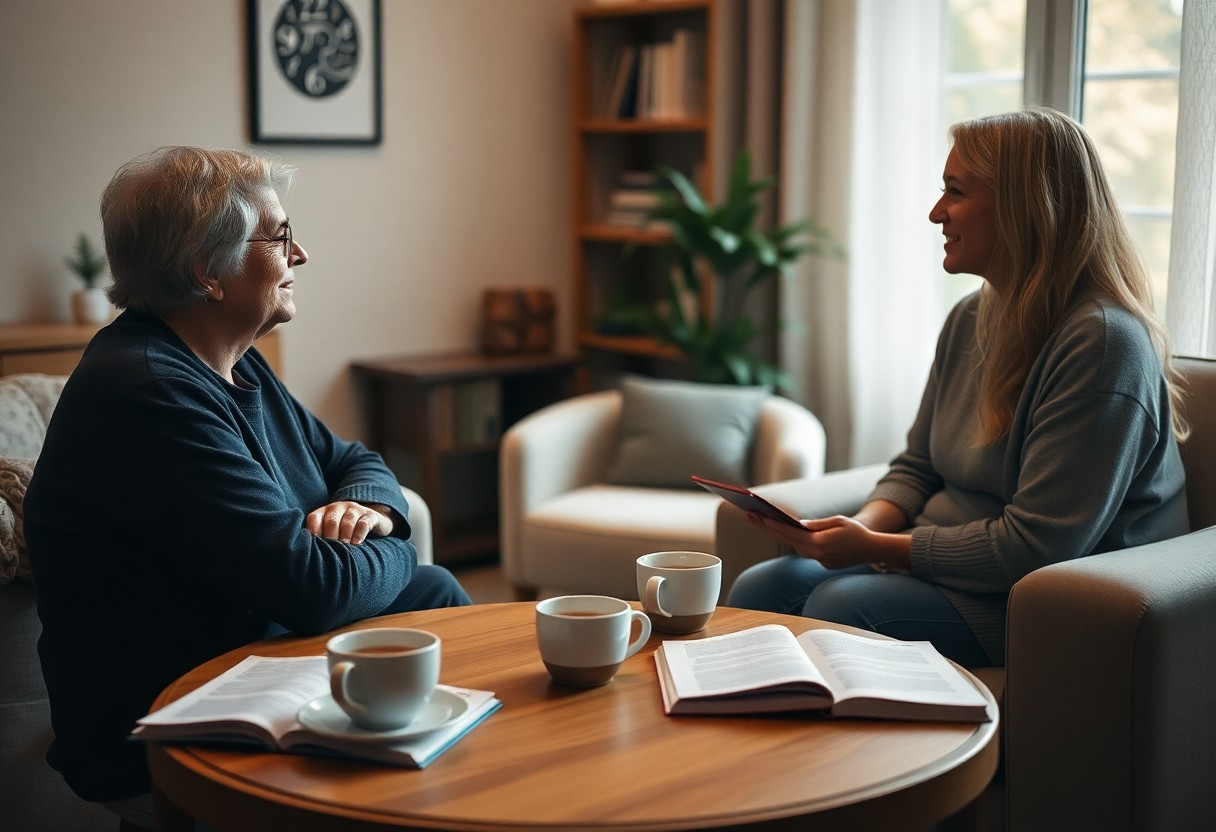Porn addiction can significantly impact both individuals and their loved ones, creating emotional barriers that are often difficult to navigate. If you’re looking to support someone facing this challenge, understanding the most effective methods to help is vital. You can start by encouraging them to seek professional assistance by exploring options like Getting Help for a Porn Addiction. This article will guide you through practical steps and strategies to provide the support they need on their journey to recovery.

Key Takeaways:
- Approach the conversation with empathy and understanding, creating a safe space for open dialogue about the addiction.
- Encourage seeking professional help, such as therapy or support groups, as these resources can provide guidance and coping strategies.
- Promote healthy habits and activities to fill the time previously spent on porn, including exercise, hobbies, and social interactions.
- Be patient and supportive throughout the recovery process, recognizing that overcoming addiction takes time and may involve setbacks.
- Help establish boundaries and identify triggers, allowing the person to develop strategies to avoid high-risk situations.
Understanding Porn Addiction
Before you can effectively help someone with a porn addiction, it is important to grasp what it truly entails. Porn addiction is characterized by compulsive use of pornography despite negative consequences, including emotional distress and interpersonal issues. This addiction can interfere with daily life, impacting relationships, productivity, and overall mental health.
Definition and Symptoms
Against common misconceptions, porn addiction can manifest in various ways, including a preoccupation with pornographic material, withdrawal symptoms when not engaging in it, and an inability to reduce or control viewing habits. You may observe changes in your loved one’s behavior, such as secrecy, neglect of responsibilities, and growing isolation.
Causes and Triggers
On a deeper level, understanding the causes and triggers of porn addiction can provide insight into your loved one’s struggles. Factors such as stress, anxiety, or past trauma often play a significant role in the development of this addiction.
Even minor triggers, such as boredom or feelings of inadequacy, can prompt someone to seek solace in pornography. Additionally, easy access to online content and societal messages can exacerbate the problem, making it difficult for individuals to resist. Recognizing these underlying causes can help you approach your loved one with empathy and support as they navigate their recovery journey.

Approaches to Help
If you’re looking to support someone with a porn addiction, various approaches can make a difference. Understanding their needs and being patient are key to helping them navigate this challenge. You may need to be flexible and aware that not every strategy works for everyone, as each person’s journey is unique.
Open Communication
Along with understanding, open communication forms the foundation of effective support. By creating a safe space where the individual feels comfortable sharing their thoughts and feelings, you can foster trust and encourage honest discussions about their addiction. This dialogue can help them express their struggles and feelings without fear of judgment.
Encouraging Professional Help
Help may also come from professional services designed to address porn addiction. Many individuals can benefit from therapy or counseling, where they will work with trained professionals to understand the roots of their behavior and develop healthier coping strategies. This external support can offer insights and tools that you might not be able to provide on your own.
Considering professional help can significantly enhance recovery efforts. Therapists often utilize a variety of techniques, including cognitive-behavioral therapy (CBT), which helps individuals identify triggers and change their patterns of thinking. Joining support groups can also be a valuable step, as they allow individuals to connect with others facing similar challenges, providing additional motivation and accountability in their journey to recovery.

Support Strategies
Keep in mind that approaching a porn addiction requires a multifaceted support strategy. Providing emotional support, encouraging professional help, and maintaining open communication are vital. Helping your loved one to understand that they are not alone can significantly ease the burden of their struggle.
Building a Support System
By encouraging your loved one to connect with a support system, you foster a safe space for them to share their experiences. This can include friends, family, or support groups who understand the challenges of porn addiction. Engaging with others who have faced similar struggles can provide empathy, accountability, and practical advice.
Setting Boundaries
One important aspect of supporting someone with a porn addiction is setting clear boundaries. These boundaries can help define what is acceptable and what is not within your relationship, enabling a healthier dynamic.
Indeed, establishing boundaries is vital not only for the person struggling with addiction but also for you as a supporter. Clearly communicate what behaviors you are willing to accept and what will lead to discomfort or harm. This ensures both parties are on the same page, fostering trust while minimizing the impact of the addiction on your relationship. These boundaries should be regularly revisited and adjusted as needed, demonstrating flexibility and understanding throughout the recovery process.
Resources for Recovery
Your journey to help someone with a porn addiction can be bolstered by various resources designed for recovery. Depending on the individual’s needs and preferences, therapy, support groups, and online communities can provide vital assistance and encouragement. Exploring these options can enhance the effectiveness of any recovery plan and create a more supportive environment for the individual in your life.
Therapy and Counseling Options
For those struggling with porn addiction, individual therapy or couples counseling can be highly beneficial. Professionals specialized in addiction can offer personalized strategies and coping mechanisms to navigate triggers and reframe unhealthy behaviors. Cognitive-behavioral therapy (CBT) is particularly effective in addressing the thought patterns that contribute to addictive tendencies, providing a solid foundation for lasting change.
Support Groups and Online Communities
Counseling also extends beyond professional therapy into support groups and online communities that provide a space for shared experiences and mutual encouragement. These platforms can help individuals feel less isolated in their struggles, as they connect with others who understand their journey. Many support groups offer structured programs, while online forums allow for flexibility and anonymity in seeking advice and sharing personal stories.
But you don’t have to face this journey alone. Many organizations offer both in-person and virtual support groups, enabling you to choose an approach that suits your comfort and schedule. Engaging with these communities fosters a sense of belonging and accountability, reminding you that recovery is a collective effort. Online forums can be particularly helpful as they provide numerous resources and allow for interaction regardless of geographical barriers, giving you access to valuable insights and emotional support any time you need it.
Coping Mechanisms and Alternatives
After recognizing the impact of porn addiction, it’s imperative to develop effective coping mechanisms and identify healthier alternatives. These strategies can help you manage urges and lead a more fulfilling life, so you can break free from unhealthy patterns. By incorporating positive habits and diversions, you empower yourself to regain control over your actions and thoughts.
Healthy Activities to Replace Viewing
Alternatives to pornography include engaging in hobbies that spark joy and creativity. Consider taking up a sport, joining a book club, or exploring new interests like cooking or painting. These activities not only divert your attention but also provide a sense of accomplishment and connection with others.
Mindfulness and Stress Management Techniques
An effective way to cope with urges is through mindfulness and stress management techniques. Practices such as meditation, deep breathing, or yoga can ground you, allowing you to stay present and focused on your feelings without resorting to porn as an escape.
And incorporating mindfulness into your daily routine can significantly enhance your emotional resilience. By dedicating a few minutes each day to meditation or deep breathing exercises, you’ll develop a stronger awareness of your thoughts and urges. This practice helps create a space between your impulses and reactions, enabling you to make conscious choices that support your recovery journey.
Monitoring Progress and Adjusting Help
Now that you have established a plan of action, it’s imperative to monitor progress regularly and be flexible with your approach. You may find useful insights in this resource on Four Things to Do When You’re Dating Someone Who …. Be open to making adjustments that better fit their needs, as recovery is not a one-size-fits-all journey. Consistent check-ins will help you gauge their feelings and challenges along the way.
Tracking Benefits and Challenges
An imperative part of helping someone with a porn addiction is to track both the benefits and challenges that arise throughout their recovery process. This can involve maintaining a journal or using apps designed for tracking progress. By documenting these aspects, you can better understand what strategies are effective and identify any obstacles that may need addressing.
Celebrating Milestones
Behind every step forward in recovery should be a celebration of milestones, no matter how small. Recognizing achievements, such as a certain number of days without indulging in pornography, can boost morale and motivation. Celebrating these moments encourages continued effort and reinforces positive behavior. It can also strengthen your bond, showing the person you support that their journey is important to you.
Adjusting your approach as progress is made or challenges arise is important, but celebrating milestones gives both you and the individual a shared moment of joy and encouragement. Whether it’s treating them to a favorite meal or simply acknowledging their efforts with a heartfelt conversation, these celebrations foster a positive environment. Each milestone strengthens their resolve and serves as a testament to their commitment to change.
Final Words
With this in mind, supporting someone with a porn addiction requires patience, understanding, and an open line of communication. Begin by engaging in honest conversations, ensuring they feel safe to share their experiences without judgment. Encourage them to seek professional help, whether through therapy or support groups, as these resources can provide necessary coping strategies. You can also assist by fostering healthier habits and engaging in activities together that promote connection and fulfillment. Ultimately, your unwavering support can make a significant difference in their journey towards recovery.
FAQ
Q: What are the signs that someone may be struggling with a porn addiction?
A: There are several signs to look out for, including excessive time spent watching porn, neglecting responsibilities or relationships, feelings of guilt or shame after viewing, secrecy about their activities, and using porn as a coping mechanism for stress or emotional issues. If you notice these signs, it may indicate a struggle with porn addiction.
Q: How can I approach someone I suspect has a porn addiction?
A: Start by fostering a non-judgmental and supportive environment. Choose a safe and private space for the conversation, and express your concerns with empathy. Use “I” statements to share your feelings, such as “I have noticed you seem different lately.” This can help open a dialogue without making them feel attacked.
Q: What are effective strategies to support someone dealing with a porn addiction?
A: Encouragement to seek professional help is crucial, as therapy can provide deeper insights and coping strategies. Being patient and offering consistent emotional support can also help. Consider engaging in healthy activities together, such as exercise or hobbies, to promote positive habits and divert their focus from porn.
Q: Should I suggest therapy or counseling for someone with a porn addiction?
A: Yes, suggesting therapy or counseling can be very beneficial. A mental health professional can provide a tailored approach, help address underlying issues, and teach coping mechanisms. If they are open to it, research options together to help alleviate some of the stress of seeking help.
Q: How can I help promote healthier habits and decisions?
A: Encourage engaging in activities that are fulfilling and rewarding, such as physical exercise, creative hobbies, or social gatherings. Offer to join them in these activities to provide companionship and accountability. Providing resources like books or online courses focused on personal development can also inspire positive change.
Q: Is it important to set boundaries when helping someone with a porn addiction?
A: Setting boundaries is crucial for your well-being and the progress of the person you are helping. Clearly communicate what behaviors or situations you find problematic, and remain consistent in your expectations. This clarity can foster a more supportive environment while maintaining your emotional health.
Q: How can I encourage them to stay committed to their recovery journey?
A: Encourage open and honest discussion about their progress and feelings. Celebrate small victories together to build motivation. Help them establish a support network, which may include friends, family, or support groups, to create an environment of accountability and encouragement during their journey to recovery.
